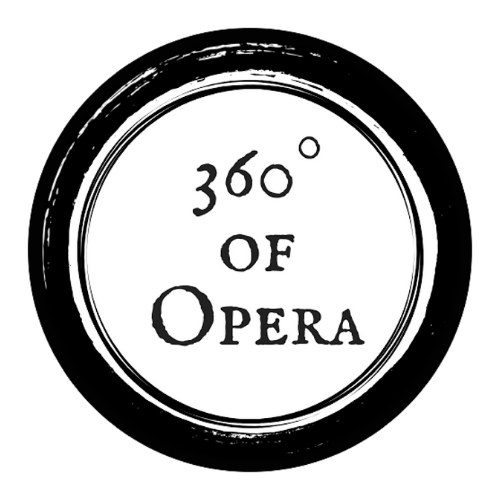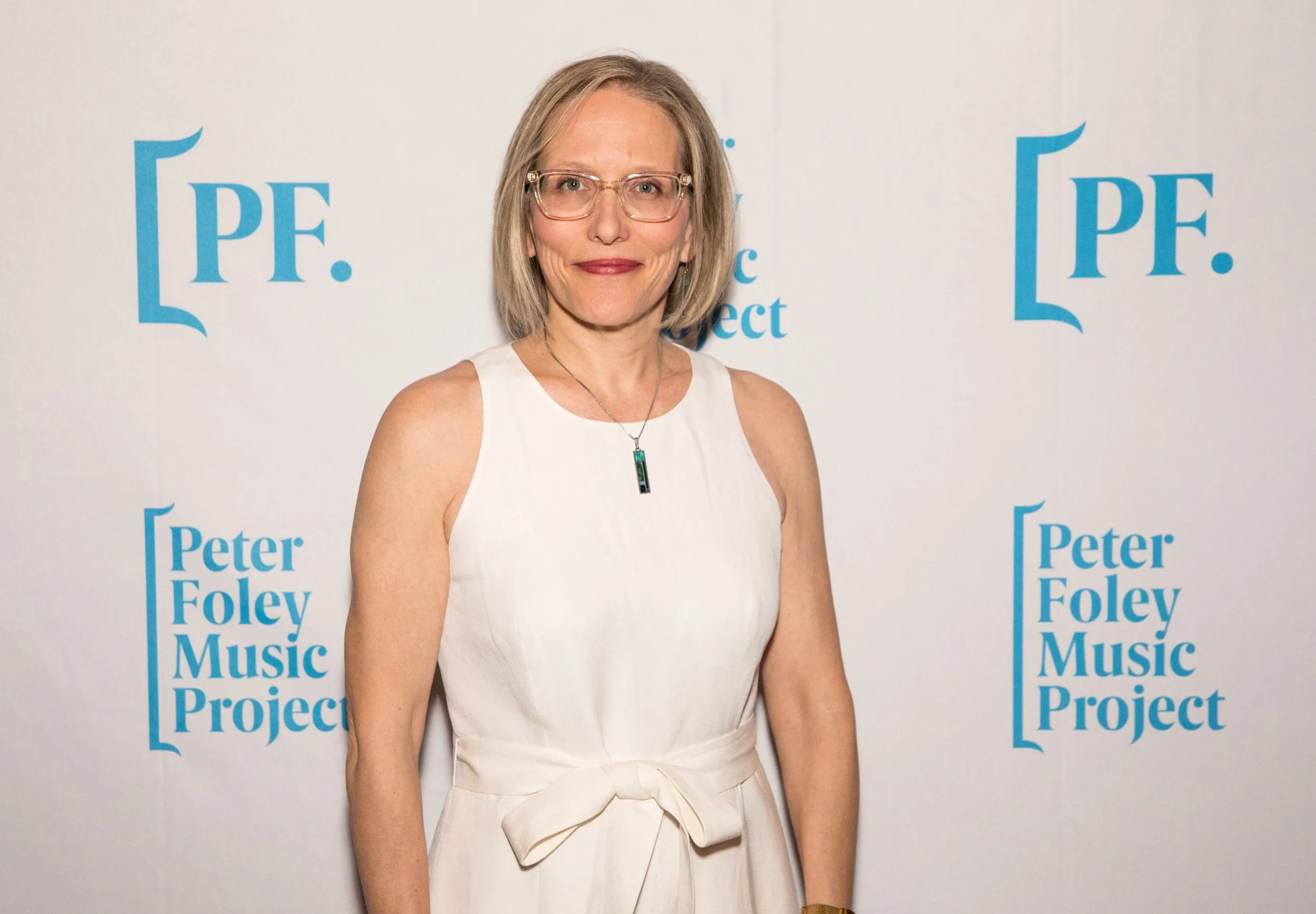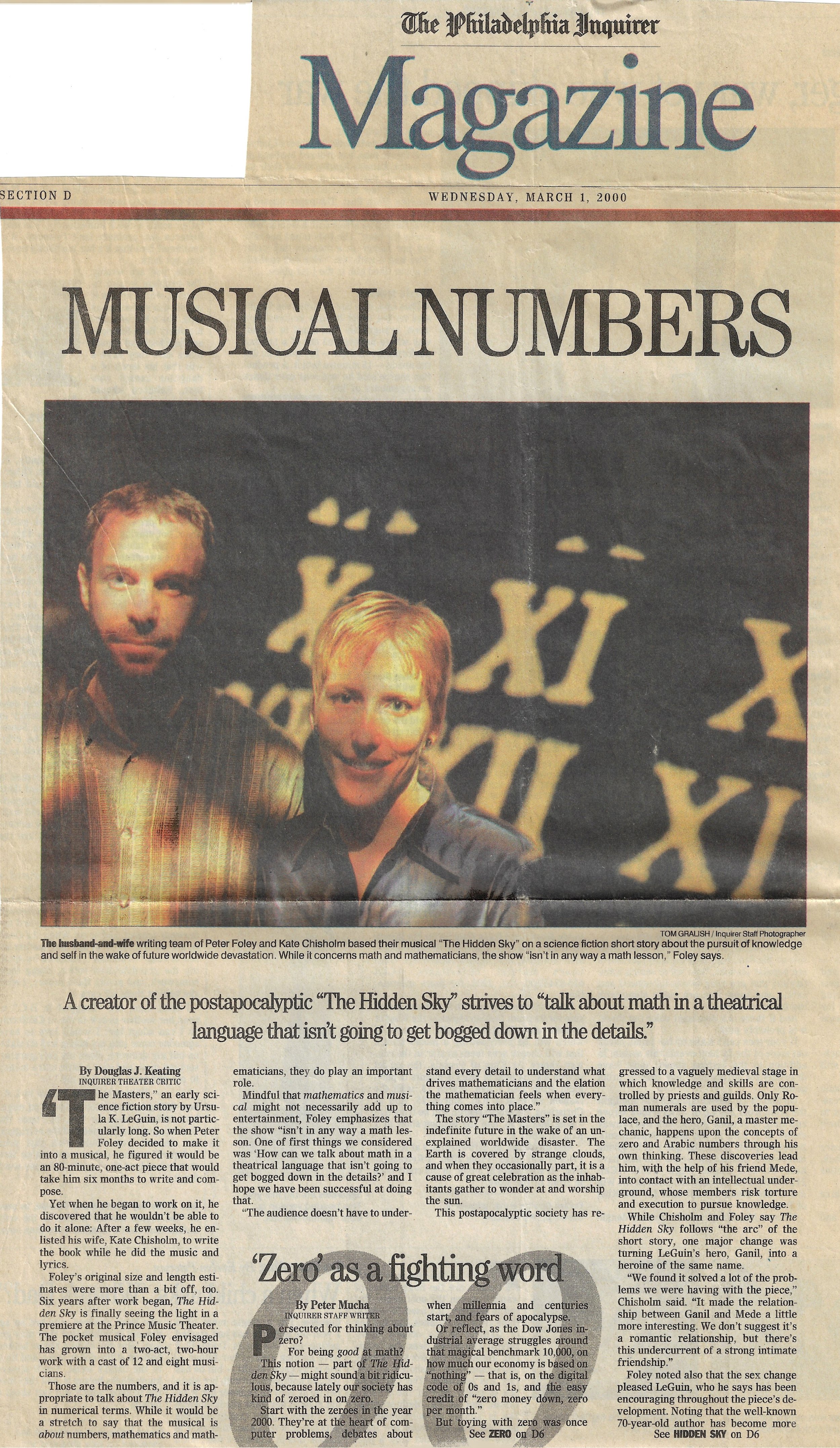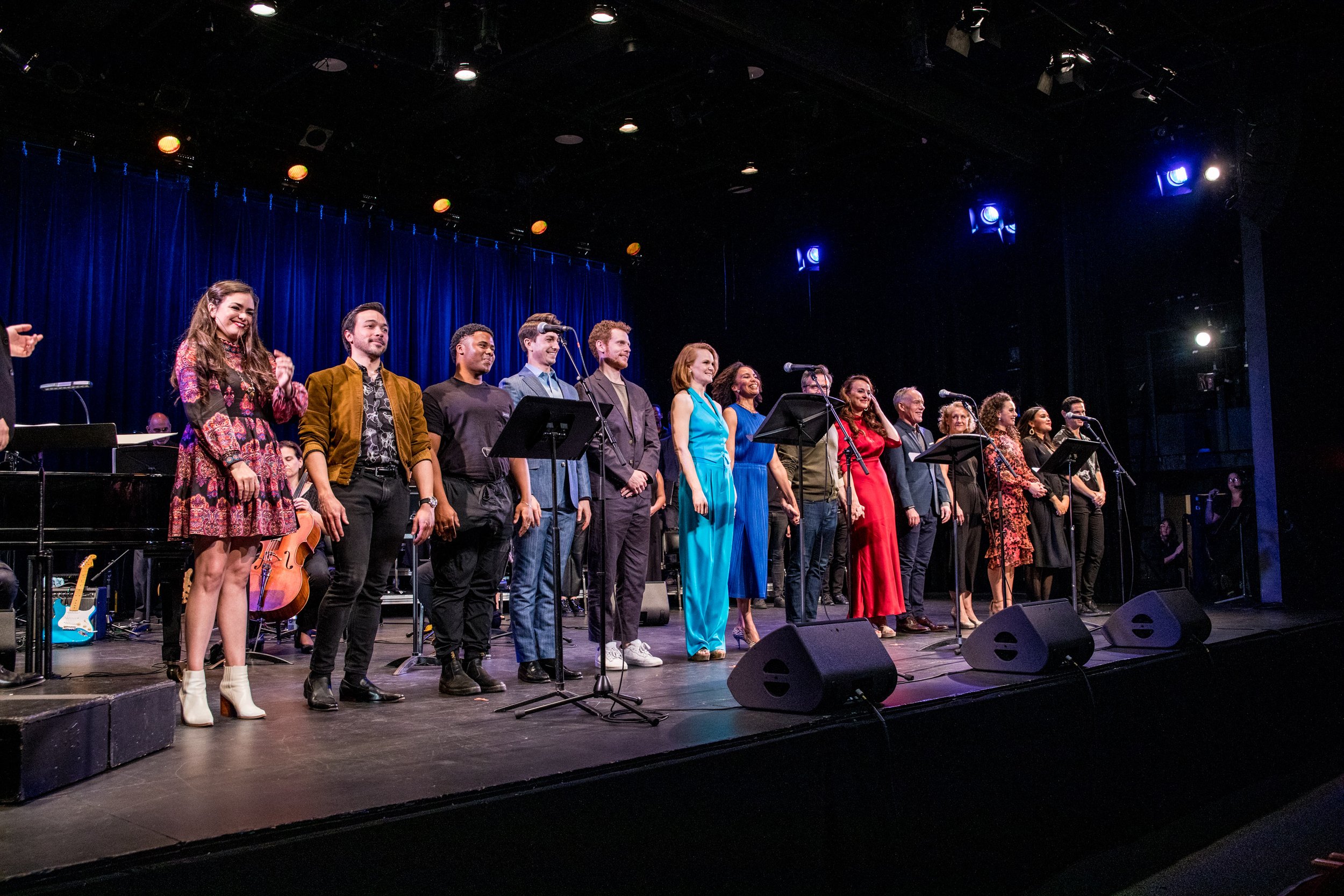Peter Foley: Songs a Widow Won't Let Die
A composer passed away before all his work reached its audience. Now his wife is making sure his songs—about awakening, love, and the human heart—finally get heard.
The following article draws from an interview with Kate Chisholm and her liner notes for the album Out of Myself – Songs of Peter Foley.
The virtual listening party was supposed to be a celebration. On July 31, 2021, Kate Chisholm gathered friends, family, and supporters on Zoom to share recordings of songs by her husband, composer-lyricist Peter Foley. Time was running short—Peter had begun home hospice care following a decade-long battle with a rare cancer, and there wasn't enough time for a live concert. Instead, they played demos and live recordings spanning his 33-year career, from 1988 to 2021.
"For many who gathered on Zoom that day, the 'concert' was a revelation," Chisholm recalls. "Despite the grief that hovered over the proceedings, the experience was profoundly life-affirming."
A month later, Peter died at age 54. But that virtual farewell laid the groundwork for something larger: a mission to introduce the world to the extraordinary songs he left behind.
On Friday, July 25, Center Stage Records released Out of Myself – Songs of Peter Foley, a 22-track album recorded live at Symphony Space in New York City. The collection features Tony-nominated Broadway stars like Kate Baldwin, Melissa Errico, and Manoel Felciano performing songs that bridge musical theater and art song, each piece a small masterpiece of emotional complexity.
A Love Story
Peter and Kate's collaboration began before their romance. They met at Yale, moving in overlapping social circles and singing groups. For his senior project, Peter wrote a full-length musical called Whitechapel and cast Kate as the female lead. In the pit were musicians who would remain lifelong collaborators, including Rob Berman, who music directed the Symphony Space concert, and Manoel Felciano, featured on the new album.
"We both wanted to move to New York City after graduating, and within six months, we were living together," Kate remembers. They married in 1994, after beginning work on The Hidden Sky, the musical that would introduce him to the professional world and win many accolades, including the Richard Rodgers Award.
Collaborating with your life partner presents unique challenges. Peter was "very, very rigorous," Kate explains, approaching composition with what music director Rob Berman calls "thousands of small choices." Peter wouldn't simply churn out a song. "He loved the challenge of writing something complex, and just took his time with things," Kate says. When she'd share a draft scene, he would examine it carefully, "making sure that everything held up well" before building an "elaborate musical life" onto it.
"He was a true artist," Kate laughs, describing how Peter would suddenly get creative ideas that couldn't wait. "He would say, 'Oh, I was thinking for this section we should…,' even when I was in the shower, and I'd say, 'Okay, just give me half an hour.'"
The boundaries between personal and creative lives "get very blurred when you're living together and collaborating artistically," she admits. "But it was also an incredible time. Peter brought out things in my imagination and writing that I might not have gotten to without him, and I think vice versa too."
The Philosophy of Opening Hearts
Peter's artistic philosophy centered on emotional honesty over ironic detachment. "He firmly resisted creating musical theater that was glib and ironic," Kate explains. "Peter wanted to write from the heart and take all of us with him."
This approach shaped his choice of source material. Rather than adapting popular movies into musicals—a trend he found troubling—Peter selected stories that would genuinely benefit from musical treatment. "If you're going to turn something into a musical, music has to really add something," Kate explains, channeling his thinking.
The result was a body of work exploring themes of awakening and self-discovery. Take The Hidden Sky, based on Ursula K. Le Guin's short story "The Masters." Set in a post-apocalyptic world where science and mathematics have been forbidden, it follows Ganil, a young woman whose thirst for knowledge leads to spiritual revelation. Kate invented an extended 20-minute sequence where the protagonist moves from practical mathematics to mystical discovery of patterns in nature.
"That idea of math as beauty and discovering unity was something very close to our hearts, and we really wanted to communicate that dramatically," Kate recalls. "So I did all this research—I'm not a mathematician, but I sort of invented this whole sequence. And then Peter distilled it into poetic lyrics and musicalized it so beautifully."
The album's centerpiece, "Revelation: All Is Number," captures Ganil's mystical discovery of mathematical patterns underlying all creation. "It's coming out of my head and into my heart," she sings, "And out of my heart and into my head... Nothing is random at all!"
Peter's musical sophistication served these dramatic purposes. "He would take one character's theme and invert it, or do those fun musical tricks like retrograde," Kate describes his approach to musical theater writing. "That kind of motivic writing really creates a very dense, unified fabric of a score."
The Unfinished Business
Peter and Kate never discussed what would happen to all the music in his wake. The end came too quickly for such conversations. In his short lifetime, Peter had created five full-length musicals, a short operetta, myriad art songs, cabaret pieces, and instrumental scores. Yet only one musical, The Hidden Sky, had received a professional premiere. Just two songs had been commercially released.
"Within a few months after Peter died," Kate says, "I was talking with friends, and we all felt, 'We have to get this music out there. This is just too good.'"
The Peter Foley Music Project was born from those conversations, incorporated as a nonprofit with a simple mission: get the music heard. Kate knew she needed help. "One of the things I've learned from starting a nonprofit is to rely on other people's expertise, to ask for help," she said. "And people have been so generous."
Building Community
Planning the Symphony Space concert meant calling in favors, sometimes relying on the theater community's kindness. Kate approached Rob Berman, who had known Peter since college and later became music director of New York City Center's Encores! series. Kate and Rob had sung a cappella jazz together in college and both worked with Peter on his first musical, Whitechapel.
"I knew Rob would deftly handle the many different stylistic worlds Peter's music inhabits and make it soar," Kate reflects.
The June 2023 production partnered with Prospect Musicals, featuring Broadway veterans and newcomers alike. "It was wonderful to get new performers in there that were encountering Peter's music for the first time, just loving it," Kate said. "That was really special."
The evening proved revelatory for audiences. "The two really ready-to-go finished shows—The Hidden Sky and The Names We Gave Him—are dramatic shows, and they're pretty devastating emotionally," Kate explains. "There's something about his music and the poetry that just takes people someplace very deep." She and Peter had "a number of people who were in The Hidden Sky or saw it, who said that it changed their lives."
The Emotional Journey
When asked what Peter wanted audiences to take from his music, Kate's answer reflects his philosophy: "Go on an emotional journey, really listen... open your heart and let it touch you."
Peter's songs resist easy categorization or simple emotional responses. "Everyone responds differently to art, based on where they are in their lives," Kate notes. "You can read the same poem at a different time of your life, and get something totally different from it."
But the composer had clear intentions about affecting his listeners. "He was so good at setting lyrics to music: if there's something in a poetic phrase that just needs a little suspension or some time to land well, he would write that into the music," she explains.
The Legacy Project
Three years into her unexpected role as musical executor, Kate continues working to place Peter's songs with performers and producers. She fields regular inquiries from singers seeking new material. "I know singers are always looking for interesting new music that hasn't been done by everybody else," she says. "There are some real treasures in there."
Beyond individual songs, Kate has larger ambitions. "I really want to get The Names We Gave Him, Peter's final musical about a World War I amnesiac, fully produced," she says. "It hasn't had a professional premiere yet, but it's completely written and orchestrated, and it's a hauntingly beautiful show."
Written with playwright Ellen McLaughlin and completed during Peter's illness, the musical explores memory, loss, and love's persistence in the aftermath of war. It represents the culmination of his artistic vision—a work about the search for meaning and truth that he finished while losing his own battle with time.
The Caretaker's Path
"It's been an honor and great responsibility to become the caretaker of Peter's work these past few years," Kate reflects, "although as his spouse, creative partner, confidante, and biggest fan of 32 years, I confess I already knew every note, every lyric."
This intimate knowledge brings both comfort and weight. "Music and theater-making were woven into the fabric of our life together for three decades. Peter lived it and breathed it. He was ambitious in his vision and rigorous in his craft."
Now she carries that vision forward through the Peter Foley Music Project, serving as translator between Peter's artistic intentions and a world that never got to really know him. The album serves as her introduction of Peter to audiences—a calling card for a composer who believed in music's power to "open hearts" and create genuine emotional connection.
"I've been living with this music for 35 years now or more," she says, "so getting to work on this project has been an amazing way to work through my grief and loss. Peter was a wonderful, wonderful person, and I miss him very much. But I also was in love with his music, and now I feel even closer to it than ever."
Kate's mission sheds light on the disconnect between artistic merit and commercial opportunity. While Peter's work moved audiences deeply and earned critical recognition, the realities of an industry favoring familiar stories over nuanced explorations meant much of his catalog remained unheard. Kate isn't preserving a private treasure—she's advocating for work that belongs in the broader conversation about contemporary musical theater, ensuring that stories that challenge audiences find their rightful place alongside more commercial fare.
As Peter said in his final public words: "Opening hearts has been my secret agenda in my entire musical life. I just want to change how you feel for a couple of minutes, and maybe put you back in touch with some feeling that you haven't felt in a while."
-written by Chloe Yang






